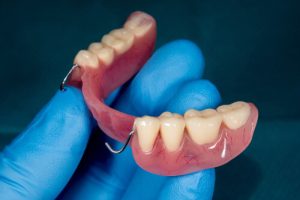Losing another tooth after getting a partial denture can feel like hitting the restart button. You’ve already adjusted to your existing denture, so the idea of making another change might leave you wondering what your next step should be. Can you add teeth to a partial denture? Is it possible to keep your current denture and simply add another tooth to it? Many people face this question when their smile changes gradually, not all at once. The answer depends on a few key things, and understanding your options can help you move forward with less stress. If you’ve been thinking about what happens next, this is where it all starts to make sense.
Why You Might Need Tooth Additions Over Time
Tooth loss rarely happens all at once. Many patients begin their denture journey with only a few missing teeth. However, as time passes, they may lose more, leading them to wonder, “Can you add teeth to a partial denture?” In many cases, yes. The ability to modify an existing denture depends on the type, material, and condition of the original design. Adjustments are often made to extend the life of the denture and support the remaining teeth.
 When An Addition Becomes Necessary
When An Addition Becomes Necessary
Tooth extractions sometimes happen in stages. If a new tooth is lost, your prosthetist can assess whether your current denture can accommodate a tooth addition. Some partials are made with flexible materials or structures that allow for this adjustment. If teeth can be added, the process may involve reshaping or relining to fit your changing bite. The success of this modification depends on the placement of the extracted tooth and the type of partial denture already in use.
Impact On Your Current Denture Fit
When additional teeth are added to an existing denture, the shape and feel may change slightly. Denture repairs and modifications must maintain the balance of the prosthesis. The surrounding natural teeth, gums, and jaw alignment must be re-evaluated to keep the bite even. Changes in your mouth, including shifting of other remaining teeth, may require careful remodelling of the denture base. A reline may also be recommended to ensure your current denture stays secure and comfortable.
Different Scenarios For Tooth Additions
Adding a tooth is often possible when the existing partial denture was made with this future flexibility in mind. For example, an acrylic base is often more adaptable than metal frameworks. A prosthetist will examine whether a new tooth can be securely placed without compromising the structure. Sometimes, only one tooth needs to be added. In other cases, more teeth may be required. If the denture no longer fits properly after the change, a new partial denture may need to be considered.
Same Day Or Delayed Additions
Depending on your situation, a tooth can be added quickly, especially with acrylic partial dentures. Some practices offer same day repairs if the tooth is being added in a non-complex area. If the work involves a cast metal base or extensive reshaping, the repair may take longer. Planning ahead after teeth extractions may speed up the process. In these cases, your prosthetist might prepare the denture in advance so you can start wearing it as soon as healing begins.
How Denture Type And Condition Influence Additions
Acrylic Vs Metal Denture Flexibility
The material of your partial denture plays a key role in whether teeth can be added. Acrylic dentures are generally easier to adjust than metal partial dentures. Flexible partial dentures also allow for minor modifications in certain cases, though extensive changes may still require full replacement. Cast metal dentures, while durable, can be harder to modify without compromising their strength or stability. The decision to add a tooth will depend on both the design and condition of the denture.
What To Expect During Tooth Addition
When a tooth or teeth are added, impressions are typically taken to capture the new shape of your mouth. The updated denture must support the new teeth without placing stress on adjacent natural teeth or the gums. Tooth addition is often done with minimal impact on the current denture, though bite adjustments may be needed. Proper care following the change will ensure the updated denture remains functional and comfortable.
Limitations With Older Dentures
Not all existing dentures are suitable for modification. Over time, wear and tear can make a denture brittle or warped. If your current denture no longer fits well or shows signs of cracks, your prosthetist may recommend a new partial denture instead of modifying the old one. This is especially true if the material has deteriorated or if multiple changes have already been made. In some cases, adding even one tooth may compromise the structure.
Alternatives When Tooth Addition Is Not Possible
If tooth addition is not possible, a new denture may be required. Depending on the location and number of missing teeth, the prosthetist may suggest a new acrylic partial or transition to a more robust metal framework. For patients needing support for back teeth or more teeth in total, metal dentures may be more stable. The decision will be guided by your denture needs, comfort goals, and individual circumstances.
 Benefits Of Updating Your Denture
Benefits Of Updating Your Denture
Keeping your partial denture aligned with your current dental condition supports both function and aesthetics. Adding new teeth helps preserve your bite and restore your perfect smile without major disruption. For patients concerned about cost effective solutions, tooth addition is often more affordable than creating a brand new appliance. It also supports oral balance and reduces stress on the existing teeth by restoring chewing support.
What Your Prosthetist Will Consider
Your prosthetist will assess the remaining teeth, gum health, and bone support before recommending whether a tooth can be added. They will also evaluate the denture material and shape. In some cases, they may use dental technology to map the jaw and model the changes before the tooth is placed. With proper care, these updates can extend the life of your denture and keep your smile looking natural and balanced.
Planning Ahead For Future Additions
If you expect more teeth may be lost in the near future, it’s important to communicate this with your prosthetist. Some patients are already aware that additional extractions may happen later. In these situations, a partial denture may be made with extra space or flexibility for tooth addition later. This approach helps reduce the number of denture replacements needed and offers peace of mind.
Recovery And Comfort After Tooth Addition
Once a tooth is added, you may need a short adjustment period. Chewing may feel slightly different until the bite settles. There may be some mild discomfort near the repaired area, especially if the denture presses on a healing extraction site. Most patients find they can return to their usual routine quickly. Your prosthetist will provide tips for cleaning and checking the updated area to make sure the denture continues to support the surrounding teeth and gums.
Key Things To Remember About Tooth Additions
Tooth addition is not always guaranteed, but it is often possible depending on the denture material and fit. Regular checkups can help your prosthetist monitor the state of your existing denture and plan for future adjustments. Denture repairs and tooth additions should always be done by a professional to ensure long-term success. If you feel changes in how your denture fits or have new gaps, book a visit early so small issues don’t become bigger problems.
 Let Us Help You Adjust With Comfort
Let Us Help You Adjust With Comfort
Tooth loss can happen gradually, but your denture doesn’t have to fall behind. Whether you need one tooth added or several, our denture clinic offers practical solutions tailored to your existing partial denture. Our experienced team will assess the fit, material, and shape to see if your current denture can support additions, helping you maintain both comfort and function. If a new denture is required, we’ll guide you through every step with clarity and care. To explore your options or plan ahead for future changes, please call us on (07) 5317 1023 or (07) 5315 8076 and let our denture clinic provide support that fits your needs.
References
https://www.ncbi.nlm.nih.gov/books/NBK279192/
https://www.healthline.com/health/dental-and-oral-health/partial-denture


 When An Addition Becomes Necessary
When An Addition Becomes Necessary Benefits Of Updating Your Denture
Benefits Of Updating Your Denture Let Us Help You Adjust With Comfort
Let Us Help You Adjust With Comfort



Recent Comments